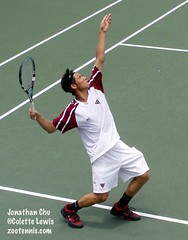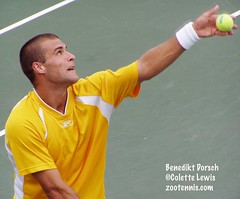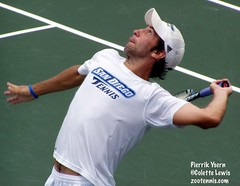Dorsch and Ysern Vie For NCAA Title; Defending Doubles Champions Ousted
©Colette Lewis 2005
--College Station TX--
As he sat in the media room, sweat dripping from his no-longer-banded forehead, Jonathan Chu of Harvard assessed his future after losing 3-6, 6-4, 6-4 to top seed Benedikt Dorsch of Baylor in the semifinals at the NCAA division 1 men’s championships in College Station Texas.
“I’m starting to believe a little more in myself,” said the unseeded New Yorker, who graduates in less than two weeks. “Others have always believed in me, but I’m starting to listen now. I hope I’ll get a few chances after this tournament to really try to do something on the next level.”
In facing Dorsch, a senior who reached the NCAA finals as a sophomore, Chu had a yardstick to measure the state of his game. And after the third point, when Chu had run down an overhead and parried two more apparent winners, Dorsch smiled to himself and nodded to the crowd, as if to say, yes, Chu is a worthy opponent.
And not just for a game or two.
When Chu broke Dorsch in the fifth and ninth games, the second break giving the Ivy Leaguer the first set, Dorsch knew he was facing an uphill climb if he was to reach his second NCAA final.
“He gets a short ball and really takes advantage of it. Most of the college guys don’t do that,” said Dorsch, who admitted that he struggled in the first set with both his game and some line calls. 
“I have to apologize to the umpires and referees today, because I had to scream a little at them to get me going. That was the only chance I had without getting a point penalty to get rid of some frustrations.”
Many of which where caused by Chu’s serve, which Dorsch jokingly referred to as “220 miles per hour”. And until the seventh game of the second set, Chu protected it, frequently putting Dorsch on the defensive. It is not a position the powerfully built 24-year-old from Germany is accustomed to, as he came into the tournament with a 29-2 record and had not dropped a set while advancing to the semifinals.
“I got a little more confident in the second set, hitting the ball and exposing his forehand at little more,” said Dorsch, “and that got me the edge.”
One break in the second set pulled him even in the match, but Dorsch squandered an early break in the third set, finding himself at 4-4. A break in the very next game however, gave him back the advantage, as a tiring Chu began to shorten the points to avoid prolonged rallies in the smothering humidity.
Dorsch, who earlier had mentioned his disappointment at losing the team championships on Tuesday to UCLA, is hoping that an individual title can help ease that pain. Chu will look back on the 2005 tournament a bit differently.
“If you had asked me a week ago, a month ago, a year ago, whether or not I could ever dream of this, I probably would have said no, but I’ll give it a shot,” he said.
“This has been an incredible tournament for me.”
As it was for the other unseeded semifinalist, Izak van de Merwe of Old Dominion, who was beaten by University of San Diego’s Pierrik Ysern 6-4, 6-4. Ysern, a junior from Paris, had lost to van de Merwe in their only previous meeting, but was eager for a rematch.
“I was up a set and a break and I put pressure on myself, and couldn’t play anymore,” said the lefthander of that first loss. “Today, I worked on staying focused and not letting anything go. If I kept focus, I knew I could beat him.”
Ysern, an alphabetical seed in the tournament, upset fourth seed Catalin Gard of Ole Miss in the quarterfinals and seventh seeded Ryler DeHeart in the round of 16.
Against van de Merwe, Ysern used his slices and speed to neutralize the power of the much larger South African.
“The first break was important, as I knew he had a big serve and I was wondering if I could break him,” Ysern said. “But the real turning point was when I broke him early in the second set.”
“I could have served better,” said van der Merwe, who eliminated the nation’s top ranked player, Sam Warburg of Stanford, in the first round, and Benjamin Becker, the defending NCAA champion, in the round of 16. “My serve let me down a little bit today.”
But he was quick to credit Ysern.
“He played really well,” said van der Merwe. “He didn’t make a lot of unforced errors and was very, very solid from the baseline. He puts you in the corners and today his forehand was very solid.”
Ysern and Dorsch have never played, but Ysern pronounced the prospect “fun” and Dorsch predicted it would be “interesting.”
In doubles action, defending NCAA champions K.C. Corkery and Sam Warburg of Stanford saw their dream of back-to-back titles evaporate when they were overpowered by Louisana State’s Mark Growcott and Ken Skupski 7-6 (1), 6-4.
“We served really well and we returned well,” said Skupski. “We volleyed well. We really didn’t do anything wrong.”
“We both have big serves,” said Skupski, who, like Growcott, is a native of Great Britain. “It’s pretty tough to break us.”
Corkery and Warburg, the second seeded team in the tournament, were not able to break the LSU pair, who are alphabetical seeds.
The loss was a difficult one for the Cardinal.
“We had expectations of defending our title, and anything less than that is going to be disappointing,” said Warburg, a senior.
“But I wouldn’t necessarily say we lost today. I’d say they beat us.”
Growcott and Skupski had the luxury of scouting their opponents, as their first straight set win of the tournament had them finished in time to watch the other semifinal.
Rest requirements for Harvard’s Chu, the only player in both singles and doubles, pushed back the start time, but as it turned out, Growcott and Skupski didn't need to gather information, as their opponents in the finals are the SEC pair of John Isner and Antonio Ruiz of Georgia, who defeated Chu and partner Ashwin Kumar 6-7 (5), 6-3, 6-4.
With an 0-3 record against the top-seeded team, the most recent loss in team play last week, Growcott and Skupski will need to find a way to derail the towering Bulldogs.
Isner, at six-feet nine-inches and Ruiz, at six-feet four-inches, are an imposing pair, and though only a sophomore, Isner is now in his second NCAA doubles final, having teamed with Bo Hodge last year.
“When you play against guys, where their average height is like, what? seven feet,” said Chu wryly, “you know you aren’t going to get a lot of chances to break.”
The only break that the scrappy Harvard pair managed was against Ruiz when he was serving for the match at 5-2. But Isner, who served exceptionally well all afternoon, stepped up at 5-4 and hammered one serve after another, with match point, appropriately enough, won via an ace.
Chu, who played more than four hours of tennis in the sultry afternoon and evening, began to show signs of fatigue, but buoyed by the energy of rested partner Kumar, the Crimson managed to eke out the first set. But unable to counter the sheer power of the Isner serve, they could find no way to duplicate that first set.
As for facing Growcott and Skupski again, Isner and Ruiz are ready.
“We expect to have a war out there,“ Isner said. “They’re two big servers. And it looks good for our conference with two SEC teams in the finals.”









0 comments:
Post a Comment